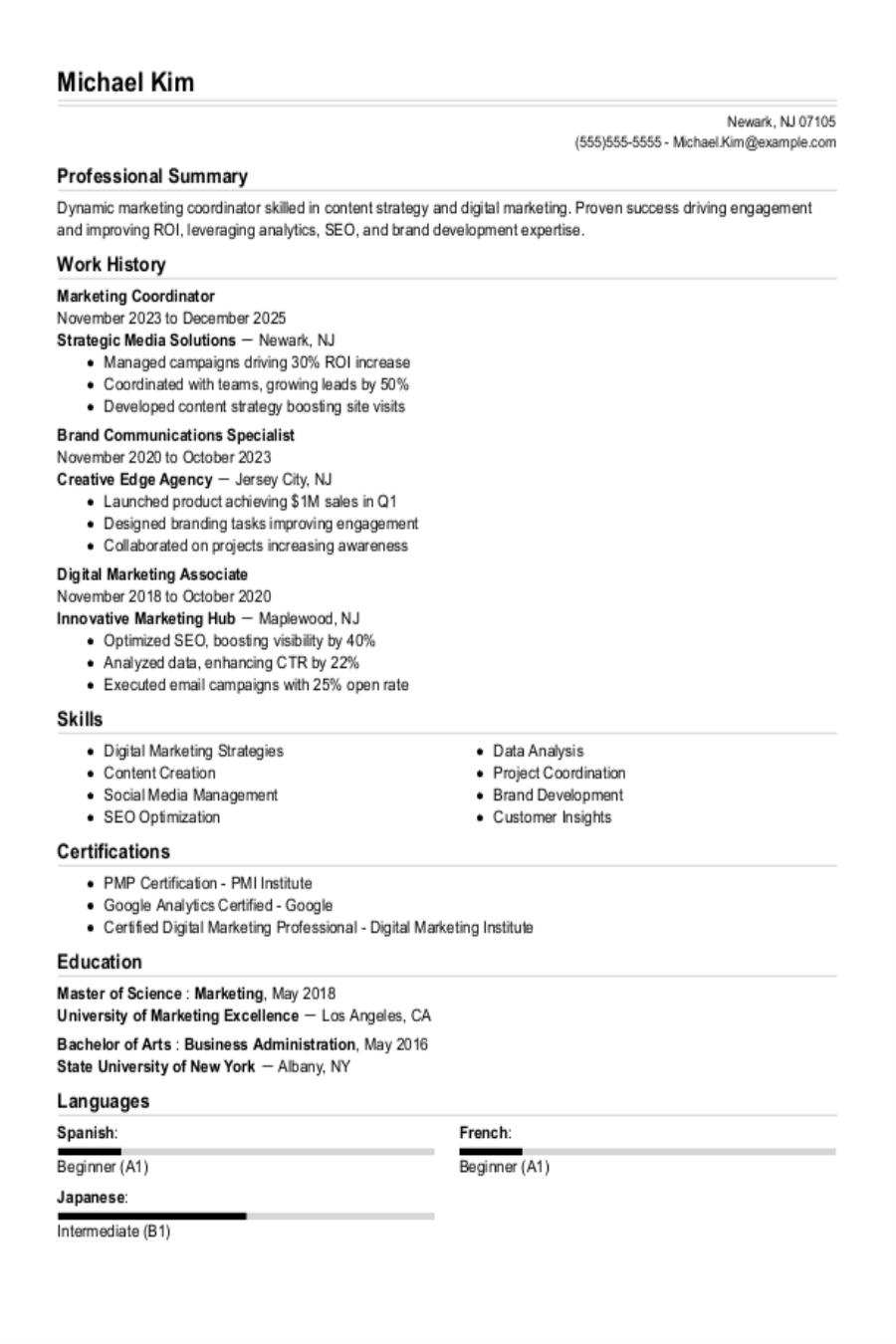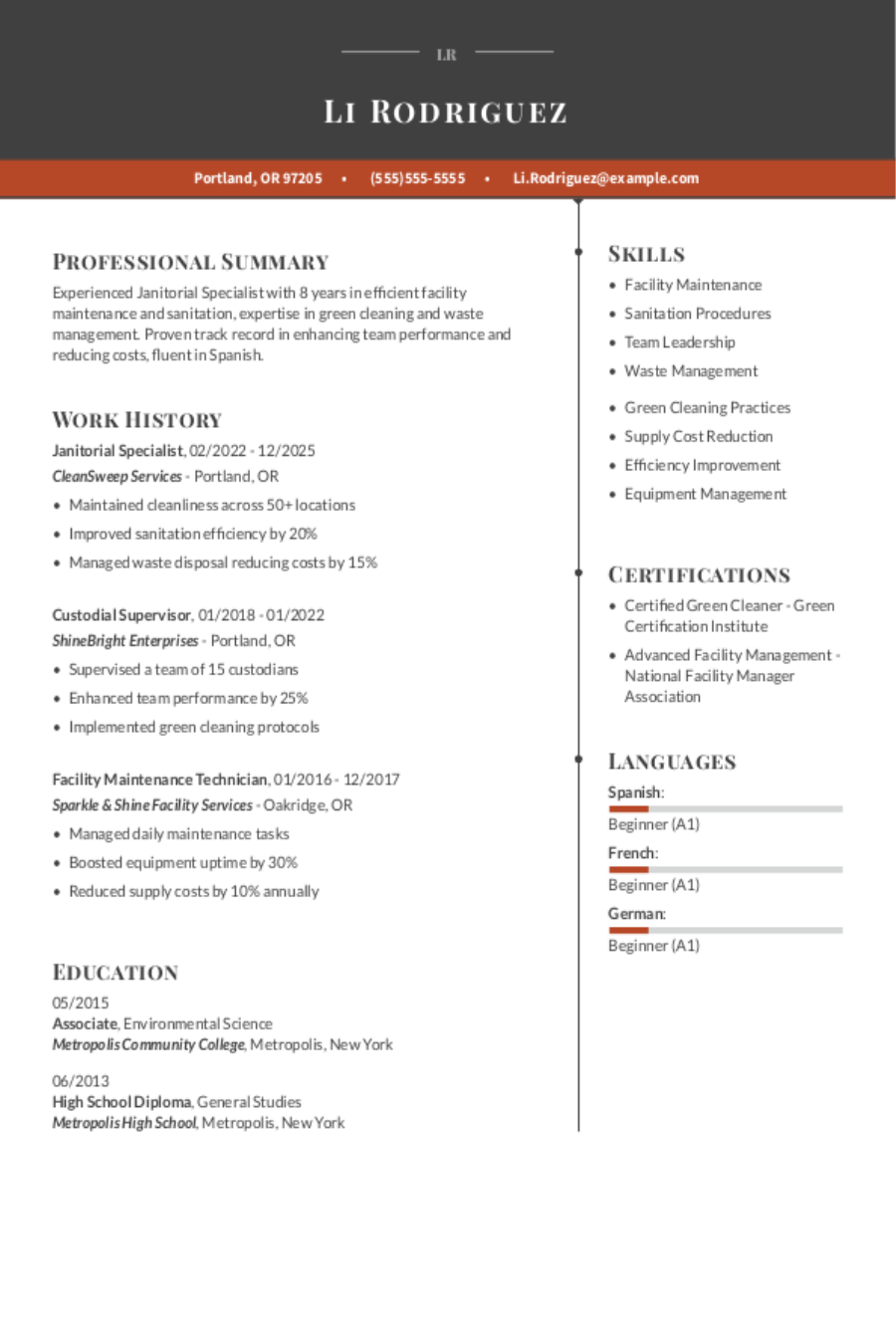Popular Dietitian Resume Examples
Entry-level dietitian resume
An entry-level resume for a dietitian should focus on relevant coursework, internships, certifications, and essential skills like nutrition assessment, patient communication, and meal planning to highlight potential strengths.
Emphasizes soft skills: This applicant's resume highlights strong soft skills, such as interpersonal skills and public speaking abilities, which effectively compensate for limited experience.
Focuses on goals: The job seeker demonstrates a strong commitment to professional development, evidenced by their powerful experiences in nutrition consulting and meal planning aimed at improving client outcomes and satisfaction.
Mid-career dietitian resume
A mid-career dietitian's resume should emphasize practical experience, nutrition expertise, and continuous professional development to effectively demonstrate growth and adaptability in the evolving health industry.
Encourages quick scanning: A well-structured layout and clear organization highlight key qualifications, making it easy for hiring managers to quickly identify relevant skills and achievements.
Includes mix of skills: This resume effectively highlights a mix of technical expertise and interpersonal abilities, showcasing the applicant's comprehensive skill set in nutrition and patient care.
Experienced dietitian resume
An experienced dietitian resume should prioritize highlighting relevant clinical experience and key achievements that demonstrate their expertise in nutrition and patient care.
Quantifies achievements: Quantifiable achievements significantly improve a dietitian's resume by providing clear evidence of impact. Metrics like improving patient health outcomes by 25% or serving over 500 patients create a compelling narrative that resonates with recruiters.
Embraces modern design: This modern resume template effectively showcases the dietitian's commitment to innovative nutritional strategies and highlights their successful track record in improving patient health outcomes through tailored meal plans and community engagement.
No experience dietitian resume
A resume for an applicant with no experience should highlight relevant coursework, certifications, and volunteer work to showcase the job seeker's knowledge and passion for nutrition and patient care.
Avoids jargon: Job seekers often feel pressured to embellish their experience with complex terminology or vague descriptions, but this resume is stronger because of its straightforwardness. Clarity and simplicity resonate more with potential employers than unnecessary jargon.
Overcomes a lack of experience: Highlighting impressive degrees and volunteer work gives this resume credibility despite the candidate's lack of experience.
More resume examples
Dietitian Resume Template
Looking for a great way to showcase your skills? Check out this dietitian resume template, which you can easily personalize with your own details and experience.
John Zhang
Parkview, MO 64158
(555)555-5555
John.Zhang@example.com
Professional Summary
Expert dietitian with 4 years of experience in clinical nutrition, personalized meal planning, and patient education. Proven ability to improve health metrics and reduce readmissions through innovative dietary strategies. Skilled in advancing public health policies and chronic disease prevention with measurable outcomes.
Work History
Dietitian
HealthyPath Nutrition Services - Parkview, MO
September 2023 - September 2025
- Developed custom diet plans, boosting compliance by 25%
- Educated clients on nutrition, improving health outcomes by 30%
- Implemented food programs enhancing clinic satisfaction scores
Nutrition Consultant
VitalWellness Clinics - St. Louis, MO
June 2020 - August 2023
- Provided nutritional advice, decreasing patient risk by 15%
- Led workshops on diabetes management for 500+ attendees
- Created content achieving an online engagement rate of 40%
Clinical Nutritionist
Balanced Wellness Center - St. Louis, MO
September 2019 - May 2020
- Designed meal plans for chronic patients improving BMI by 10%
- Collaborated with physicians enhancing patient outcomes by 20%
- Monitored nutritional data reducing readmission rates by 8%
Skills
- Meal Planning
- Nutritional Counseling
- Dietary Education
- Diabetes Management
- Chronic Disease Prevention
- Food Program Implementation
- Data Analysis in Nutrition
- Advocating Public Health Policies
Education
Master's Degree Dietetics and Nutrition
University of California, Berkeley Berkeley, California
June 2019
Bachelor's Degree Human Nutrition
University of Washington Seattle, Washington
June 2017
Certifications
- Certified Nutrition Specialist - American Council on Nutrition
- Weight Management Specialist Certification - Academy of Nutrition and Dietetics
Languages
- Spanish - Beginner (A1)
- French - Beginner (A1)
- German - Intermediate (B1)
Must-Have Skills on a Dietitian Resume
A strong skills section is important for highlighting your qualifications and making a lasting impression on potential employers.
The following data provides insights into the most sought-after hard and soft skills for dietitian resumes based on our extensive research.
When you’re ready to improve your resume, check out our AI Resume Skills Generator. It offers tailored suggestions for both hard and soft skills according to your specific job title, ensuring a comprehensive skill set that stands out.
Writing Your Dietitian Resume
Having explored these effective resume examples, you are now prepared to dive into the process of how to write a resume. We will guide you through each section step by step, ensuring you create a standout application.
List your most relevant skills
A dietitian resume should feature a skills section that focuses on including keywords from the job listing that reflect the requirements of the role. This not only showcases your qualifications to recruiters but also helps you navigate applicant tracking systems effectively.
Incorporating keywords from the job listing demonstrates your alignment with their needs. For instance, if they mention "nutritional assessment" or "patient education," ensure these terms are prominent in your skills section. This targeted approach will make it clear to hiring managers that you possess the necessary skills and improve your chances of making it through initial screenings.
Example of skills on a dietitian resume
- Proficient in developing personalized nutrition plans based on individual health needs
- Knowledgeable in interpreting dietary guidelines and nutritional research
- Strong communicator with the ability to educate clients effectively
- Compassionate listener who fosters a supportive environment for client success
The skills section of your resume plays a key role in showcasing your readiness for the dietitian role. It should incorporate both the technical skills identified in the job description and essential soft skills, highlighting your ability to fulfill the responsibilities of the position effectively. This balanced presentation makes you an attractive applicant for potential employers.
Highlight your work history
A compelling work experience section should effectively highlight your achievements, illustrating how you've applied your expertise to positively impact clients' health and well-being. Focus on showcasing specific results you've achieved through tailored nutrition plans or successful dietary interventions, which will demonstrate the tangible benefits of your skills.
For each job entry, ensure you include important details such as your title, the employer's name, and the employment dates. These elements help establish a clear timeline of your professional journey and offer employers insight into your career's breadth and depth. Highlight measurable outcomes that show the value you brought to previous roles.
Example of a dietitian work experience entry
- Dietitian
Health First Nutrition - San Diego, CA
June 2019 - Present - Conduct comprehensive nutritional assessments for over 100 clients per month, developing personalized meal plans that cater to individual health goals and dietary restrictions
- Educate clients on healthy eating habits through workshops and one-on-one counseling sessions, resulting in a 30% improvement in client adherence to dietary recommendations
- Collaborate with healthcare teams to create integrated care plans for patients with chronic conditions, improving overall patient satisfaction by 25%
- Monitor client progress regularly and adjust meal plans as necessary, achieving a 90% success rate in weight management programs
- Develop engaging content for social media platforms and newsletters that increase community awareness of nutrition services by 40%
Craft your resume bullet points to be effective yet concise. Aim for clarity by including specific results or skills, ensuring each point is meaningful without unnecessary detail.
Include your education
The education section of your dietitian resume should clearly present your academic qualifications in reverse-chronological order, starting with your most recent degree. Include relevant degrees and certifications while omitting your high school diploma if you hold a bachelor's degree or higher.
For those with ongoing education or incomplete degrees, it is important to list the highest level achieved and include an expected graduation date. You can also highlight significant coursework or academic honors that relate directly to dietetics.
Common certifications for a dietitian resume
- Registered Dietitian Nutritionist (RDN) – Academy of Nutrition and Dietetics
- Certified Diabetes Educator (CDE) – National Certification Board for Diabetes Educators
- Board Certified Specialist in Sports Dietetics (CSSD) – Commission on Dietetic Registration
- Certified Clinical Nutritionist (CCN) – Clinical Nutrition Certification Board
Sum up your resume with an introduction
Creating a compelling profile section is essential for making a strong first impression on potential employers. This brief introduction serves as your opportunity to showcase your professional identity and set the tone for the rest of your resume, capturing the attention of hiring managers right away.
If you are an experienced applicant, using a professional summary is an effective strategy. This allows you to highlight your key achievements and skills at the forefront of your resume, demonstrating your qualifications in a concise manner. If you lack extensive work history, try a resume objective that reflects your goals and enthusiasm for development.
Professional summary example
Compassionate dietitian with 10 years of experience in clinical nutrition. Demonstrated success in developing personalized nutritional plans, improving patient outcomes, and promoting healthy lifestyle changes. Expertise in dietary assessments, meal planning, and nutritional counseling.
Resume objective example
Enthusiastic dietitian eager to apply foundational knowledge in nutrition and wellness to support a compassionate healthcare team. Committed to using strong communication and analytical skills to promote healthy eating habits and improve patient care outcomes.
As a dietitian applicant, your resume profile should be succinct yet packed with essential information. Aim to limit it to three sentences that highlight your most important qualifications and achievements. Save any additional details for your cover letter, where you can expand on your experience and passion for the field.
Add unique sections to set you apart
Including optional resume sections can help you stand out as a dietitian by highlighting your unique qualifications. These sections allow you to showcase additional skills and experiences that make you an ideal job seeker.
Consider including relevant hobbies or volunteer work that align with your professional values. For example, if you participate in community wellness programs or engage in cooking classes, these activities reflect your passion for nutrition and health. Sharing these aspects not only enriches your resume but also gives potential employers insight into your commitment and working style as a dietitian.
Three sections perfect for a dietitian resume
- Languages: As a dietitian, effective communication is essential for educating clients about nutrition. Including language skills on your resume can improve your ability to connect with diverse populations and improve client outcomes.
- Volunteer Work: Including volunteer work on a resume not only showcases your dedication to helping others but also highlights essential skills that improve your professional profile. It’s a great way to stand out and connect with employers.
- Accomplishments: As a dietitian, quantifiable accomplishments demonstrate your effectiveness in promoting health and wellness. Feature these achievements by folding them into your work experience or outlining them in a unique accomplishments section.
5 Resume Formatting Tips
- Choose a format that matches your career stage.
Selecting the right resume format is important for showcasing your skills. If you're an experienced dietitian, a chronological format highlights your career progression effectively. For those just starting, consider a functional resume to emphasize relevant skills over experience. A combination format can also serve well if you have both experience and skills to showcase.
- Pick a smart resume template.
Using a resume template that is professional can significantly improve readability. A well-structured format allows hiring managers to quickly grasp your qualifications. If you opt for a custom design, prioritize clarity and choose fonts that are friendly to applicant tracking systems.
- Select an appropriate font.
For better readability in your resume, choose a clean, professional font. Fonts like Helvetica, Georgia, or Verdana are excellent choices that maintain clarity for both ATS and hiring managers.
- Use consistent formatting.
Align your resume to the left and maintain uniform margins. This creates a clean, professional look that improves readability and makes a strong impression on employers.
- Keep your resume to one or two pages.
When crafting your resume, remember that resumes should be one page long unless you have extensive experience. Ensure your content remains concise and focused on the key information that highlights your skills and accomplishments.
What’s the Average Dietitian Salary?
Dietitian salaries vary based on location, career level, and qualifications.
This data, provided by the Bureau of Labor Statistics, will show you expected salary ranges for dietitians in the top 5 highest-paying states, including the District of Columbia. The figures reflect the most current salary data available, collected in 2024.
- Full Range
- Most Common (25th–75th percentile)
- Average
California
Most common: $78,250 - $105,750
Oregon
Most common: $75,800 - $99,400
Connecticut
Most common: $67,400 - $91,620
Alaska
Most common: $73,050 - $96,320
Maryland
Most common: $65,850 - $93,320
Tools for Your Job Search
Are you preparing to apply for that dietitian position you've been eyeing? Before submitting your application, consider using our ATS Resume Checker. This tool gives you insights into how well your resume performs with the automated systems many healthcare organizations use for initial screenings.
Looking for a way to make your resume stand out? Our AI Resume Builder offers tailored content recommendations specific to your dietetic background, along with professionally designed templates that effectively showcase your expertise and qualifications to potential employers.
Frequently Asked Questions
Last Updated: October 14, 2025
Absolutely. A cover letter is important as it provides essential context to your resume and creates valuable communication opportunities with potential employers. It gives you the chance to express your passion for the dietitian role and how your unique skills make you a great fit. Don’t overlook this step—write a cover letter that improves your application.
For a quick and effective solution, consider using our AI Cover Letter Generator. It helps you create tailored, job-winning cover letters in just minutes. Plus, you’ll find matching cover letter template options that align perfectly with your resume, ensuring consistency in your professional presentation.
A resume is a concise document, usually spanning one to two pages, that highlights your skills and experiences relevant to a specific job. In contrast, a curriculum vitae (CV) can extend several pages, offering comprehensive details about your academic background, research contributions, publications, and professional experiences.
You typically use CVs for specialized roles in academia or fields like law and medicine. If you need a CV for your next opportunity, our online CV Maker is here to help! With various CV templates tailored for different industries and career levels, you can create a polished CV quickly and efficiently.
To write a strong CV, focus on structuring your information under clear headings such as education, work experience, skills, and certifications. Opt for professional templates that are visually appealing and compatible with applicant tracking systems. Tailor your content by integrating relevant keywords from the job description to improve your chances of getting noticed.
Additionally, consider reviewing CV examples from professionals in your field. These can provide valuable insights into how successful job seekers showcase their expertise and achievements. Use these examples as a source of inspiration to refine your own presentation and style.
Improve your dietitian resume by focusing on the critical skills needed for your desired position. Review job listings to find keywords that match your expertise and integrate them into your resume, showcasing how perfectly you fit the role.
Many dietitians start as nutrition assistants or interns, gaining practical experience. By obtaining advanced degrees or certifications, they can progress to senior dietitian roles or specialize in areas like clinical nutrition or public health.
Improve your career as a dietitian by actively pursuing continuing education and certifications. Join relevant professional organizations, engage with the latest research, and attend workshops or webinars focused on nutrition trends. Staying informed and connected will help you showcase your expertise and commitment to the field.
Was this information helpful? Let us know!
Hailey is a career advice writer dedicated to helping job seekers excel in their careers.
More resources

The Most Dangerous Jobs in America: Some Pay Less Than $40K, Others Top $190K
Resume Now s report reveals the highest and lowest paying dang...

Still in the Game: 9 in 10 Older Workers Are Upskilling to Stay Competitive
The idea that older workers are resistant to change doesn t ho...

The AI Boss Effect: 97% of Workers Have Asked ChatGPT for Advice Instead of Their Manager
Resume Now s latest report explores how AI is replacing manage...

Advertising Resume: Examples & Templates
As an advertising professional you need a resume that capture...

Marketing Coordinator Resume: Examples & Templates
As a marketing coordinator you need a resume that highlights ...

Janitorial Resume: Examples & Templates
As a janitorial professional you need a resume that highlight...

